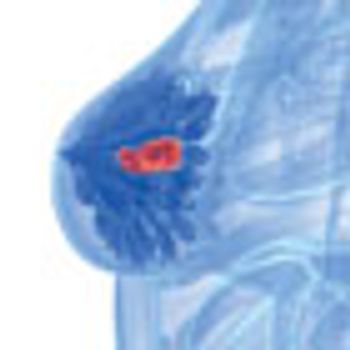
Pembrolizumab (Keytruda) had an overall response rate (ORR) of 45.2% among a cohort of patients with high PD-L1-expressing non–small cell lung cancer (NSCLC) in the phase I KEYNOTE-001 trial.

Pembrolizumab (Keytruda) had an overall response rate (ORR) of 45.2% among a cohort of patients with high PD-L1-expressing non–small cell lung cancer (NSCLC) in the phase I KEYNOTE-001 trial.

New research reported at the AACR Annual Meeting has found that decreasing the number of hours spent eating each day and increasing the number of hours spent fasting overnight may reduce a woman's risk of developing breast cancer.

The award honors exceptional nurses who have been nominated through personal essays from patients, families, and coworkers.

A new study has shown that vaccinating adolescent boys may be cost-effective for preventing oropharyngeal cancer, a disease that's projected to become the most common HPV-related cancer by 2020.

A new study has found that obesity is associated with an increased risk for prostate cancer in African American men, a risk that grows by nearly four times as an individual's body-mass index (BMI) increases.

Clinical Trials tend to be an affordable opportunity for patients looking to explore alternative treatment options. Here's all you need to know about the ins and outs of clinical trials.

A new telephone-based intervention for breast cancer survivors is showing promise, and it involves them becoming more actively engaged in goal setting and problem solving with an eye toward accelerating their recovery by engaging in health-promoting activities such as exercise, stress management, and healthy eating.

Maggie is currently the Founder and CEO of the nonprofit organization, Help Keep a Sister Alive (HKASA) whose website (helpkeepasisteralive.org) assembles, in one place, information to help patients, survivors, caretakers, friends and family cope with ovarian cancer and other cancers affecting women.

A new study has found that patients with lower vitamin D levels prior to treatment for follicular lymphoma are more likely to die or relapse from the disease earlier than patients with adequate vitamin D levels in their blood.

The possibility of going bankrupt is high on the list of concerns for 37.1% of cancer patients who participated in a recently published survey by the Washington, DC-based Cancer Support Community (CSC), an international nonprofit.

The Search for Well-Being: Treating the Whole Person in the New Health Care Era. A Primer on Integrative Medicine is a free booklet that can be viewed online or downloaded

The National LGBT Cancer Network's research found that, compared with other survivors, lesbian, gay, bisexual, and transgender individuals often have some striking differences in who they turn to for support during cancer treatment.

April is Oral Cancer Awareness Month

Many women who are diagnosed with breast cancer are concerned about the genetic risk of developing other cancers themselves or of a loved one developing cancer. However, a large amount of those concerns are not being addressed, according to a new study.

Melissa Long knows firsthand what it is like to battle isolation and depression as a teenage cancer survivor. Today, as a pediatric oncology nurse, she helps children and teens with cancer battle their disease while also using her own experience to help prepare them for possible late effects of treatment-especially the ‘invisible' emotional ones.

Angelina Jolie Pitt recently added another chapter to her BRCA mutation story, making public her choice to undergo a preventive salpingo-oophorectomy, removal of her ovaries and fallopian tubes to reduce her risk of cancer.

The link between diabetes and late-stage breast cancer is strong, according to a new study.

I had firmly put cancer in my rear view mirror seven-years prior. Yet here I was, hearing for the word "cancer" for the second time by the age of 26.

Analyses of clinical trials continue to illuminate the role of the PARP inhibitor olaparib (Lynparza) in the treatment of women with ovarian cancer, Ursula A. Matulonis, MD, explained during a plenary session at the 2015 Society of Gynecologic Oncology's Annual Meeting on Women's Cancer.

A new study has found that older, single white males with advanced bladder cancer have the highest suicide risk among those with other cancers of the male genitals and urinary system.

Treatment with bevacizumab (Avastin) plus chemotherapy resulted in a non-statistically significant improvement in overall survival (OS) of nearly 5 months compared with chemotherapy alone for women with platinum-sensitive recurrent ovarian cancer.

A new study has found that although the number of childhood cancer survivors is increasing, the majority of those to survive 5 or more years beyond diagnosis have at least one chronic health condition.

The FDA has approved deferasirox (Jadenu) for the treatment of chronic iron overload, a condition that can affect patients with myelodysplastic syndromes (MDS), sickle cell disease, and thalassemia.

The premiere last night of "Cancer: The Emperor of All Maladies," a three-part film by acclaimed documentary filmmaker Ken Burns lit up twitter last night, with patients, survivors, practitioners, researchers, advocates, and more sharing their thoughts on the first episode.

A new study has found that current smoking and heavy alcohol consumption appear to be risk factors for prolonged use of a gastrostomy tube (GT, feeding tube) in patients with head and neck cancer who are undergoing radiotherapy or chemoradiotherapy.

Increased risk of bone fracture noted among patients aged 45-64 years.

A new study has shown that men with a high fitness level in midlife are not only at a lower risk of developing lung and colorectal cancer, they're also at a lower risk of dying from cancer if they're diagnosed later in life.

"Male nurses are found to earn about $5,000 more than female colleagues." (Not quite) shocking news!

Pierre Adams shares her story on being diagnosed while being pregnant with twins

In 2009, Connecticut became the first state to enact legislation mandating that patients undergoing mammography be informed of their breast density and the option to have a follow-up ultrasound.